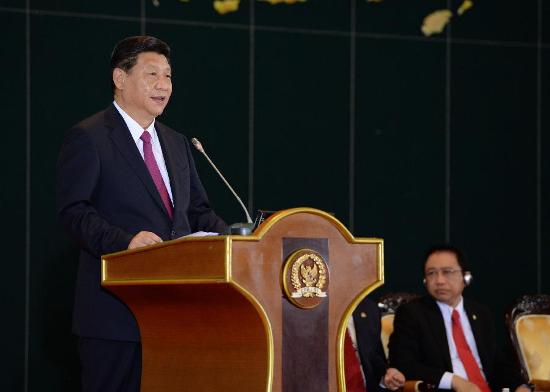Xi's Indonesia visit lifts bilateral ties, charts future cooperation
 0 Comment(s)
0 Comment(s) Print
Print E-mail Xinhua, October 4, 2013
E-mail Xinhua, October 4, 2013
|
Chinese President Xi Jinping delivers a speech to Indonesian lawmakers at the House of Representatives of Indonesia in Jakarta, capital of Indonesia, Oct. 3, 2013. (Xinhua/Ma Zhancheng) |
Chinese President Xi Jinping on Thursday wrapped up a two-day state visit to Indonesia that saw the two countries lift their ties to a comprehensive strategic partnership.
During his stay in Indonesia, Xi proposed to establish an Asian infrastructure investment bank so as to promote regional interconnectivity and economic integration.
He also called for joint efforts to build a more closely-knit community of common destiny between China and the Association of Southeast Asian Nations (ASEAN).
Indonesia is the first Southeast Asian country Xi has visited since he assumed presidency in March, which reflects the country's important role in China's diplomacy with neighboring countries.
COMPREHENSIVE STRATEGIC PARTNERSHIP
Xi and his Indonesian counterpart, Susilo Bambang Yudhoyono, held talks Wednesday and agreed to lift bilateral ties to a comprehensive strategic partnership.
Noting that profound and complicated changes are taking place in global and regional landscapes, Xi pointed out that it is an inevitable choice for the two countries to further strengthen their strategic cooperation.
China regards Indonesia as a priority in its diplomacy with neighboring countries, and stands ready to comprehensively deepen bilateral cooperation so as to realize common development for the benefit of both peoples, Xi said.
The two countries vowed to boost cooperation in such areas as infrastructure construction, manufacturing, agriculture, investment and financing, so as to create new growth points and increase bilateral trade to 80 billion U.S. dollars by 2015.
They agreed to encourage the active participation of Chinese enterprises in the construction of Indonesia's six major economic corridors, and support the building of a joint comprehensive industrial park in the Southeast Asian country.
The two countries also promised to strengthen cooperation in the fields of oil, natural gas and new energy, so as to forge a long-term and reliable energy cooperation partnership.
To deepen fiscal and financial cooperation, they vowed to extend a 100-billion-RMB (about 16.3 billion dollars) bilateral currency swap agreement with the prospect of further expanding its scale.
Meanwhile, the two sides agreed to enhance maritime cooperation, establish an intergovernmental fishery cooperation mechanism, and launch negotiations on fishing arrangements.
They also pledged to establish an aerospace cooperation mechanism, and carry out cooperation in such fields as space tracking and control, and satellite launch and application.
In addition, the two countries agreed to strengthen security communication and coordination through defense consultations and navy dialogues, and thus deepen China-Indonesia and China-ASEAN security cooperation.
They also vowed to beef up exchanges and cooperation in fighting cross-border crimes and terrorism and in disaster prevention and relief.
In a joint statement titled "Future Direction of China-Indonesia Comprehensive Strategic Partnership," the two sides agreed that it is the common responsibility of the countries in the region to maintain peace and stability in the South China Sea.
The document urged China, Indonesia and other ASEAN countries to work together to fully and effectively implement the Declaration on the Conduct of Parties in the South China Sea (DOC), enhance mutual trust, promote cooperation, and maintain peace and stability in the South China Sea.
The two sides also agreed to work towards the eventual adoption of a code of conduct in the South China Sea in line with the principles and spirit of the DOC.
CHINA-ASEAN COMMUNITY OF COMMON DESTINY
As the first foreign head of state to deliver a speech in the House of Representatives of Indonesia, Xi not only expounded on bilateral ties, but called for the building of a China-ASEAN community of common destiny.
China, he said, is willing to work with Indonesia and other ASEAN countries to ensure that China and ASEAN are good neighbors, friends and partners.
For the purpose of building a more closely-knit China-ASEAN community of common destiny, Xi proposed that the two sides cement trust and develop good-neighborliness.
China and ASEAN countries, he suggested, should also work for win-win cooperation, stand together and assist each other, enhance mutual understanding and friendship to increase the social support for bilateral ties, and stick to openness and inclusiveness.
Beijing is prepared to elevate the level of the China-ASEAN free trade area and aims to expand two-way trade to one trillion dollars by 2020, said the Chinese president.
China is committed to promoting interconnectivity with ASEAN countries, and is willing to help improve infrastructure interconnectivity among developing countries in the region, including ASEAN members, he added.
With regard to differences and disputes between China and some Southeast Asian nations on territorial sovereignty and maritime rights in the South China Sea, Xi stressed that peaceful solutions should be sought.
Differences and disputes should be properly handled through equal-footed dialogue and friendly consultation in the overall interests of bilateral ties and regional stability, he said.
Moreover, Xi emphasized that China is fully committed to the path of peaceful development.
A stronger China will present development opportunities, rather than pose threats, to Asia and the world, said Xi, adding that China "will continue to share opportunities for economic and social development with ASEAN, Asia and the world."







Go to Forum >>0 Comment(s)